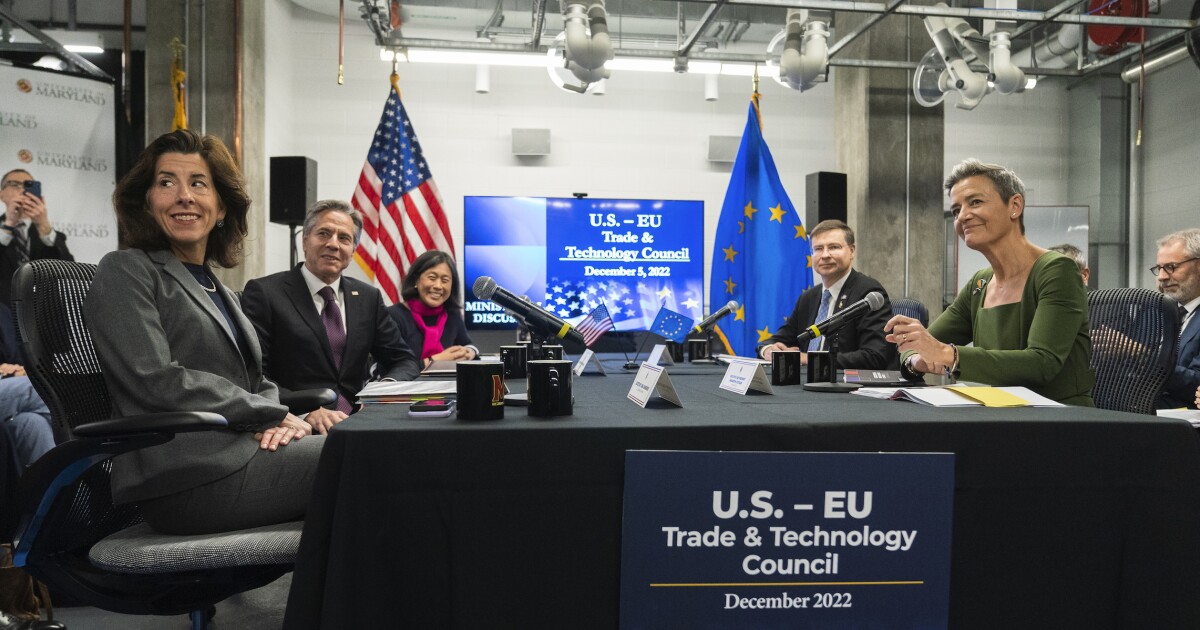

U.S. and European allies could tighten the restrictions on China
’s technology suppliers in a bid to mitigate the risk of a war over Taiwan
, but trade tensions could undermine a wider trans-Atlantic front.
“We’re collaborating around an early warning system for supply chain disruptions,” Commerce Secretary Gina Raimondo told reporters Monday. “We are collaborating and aligning around how we share information about our subsidies, so that we work together to coordinate our subsidies, and also around export controls.”
Raimondo touted that coordination following a meeting of senior U.S. and European Union officials at the University of Maryland under the auspices of the U.S. and EU’s Trade and Technology Council, a forum founded with the foal of forging “a common market for tech.” That ambition has been undermined somewhat by new U.S. clean energy manufacturing subsidies that could undercut European businesses, but the officials put a collegial spin on the controversy.
“We are working together between the United States and the European Union to build ever-greater convergence on some of the most critical issues of our time,” Secretary of State Antony Blinken said alongside Raimondo. “We can do that in a way that will benefit people on both sides of the Atlantic and ultimately benefit people around the world. We’ve seen very practical, positive work done in these sessions.”
FOXCONN TO REOPEN IPHONE FACTORY AFTER COVID-19 RIOTS AND DECLINING REVENUE
The Biden administration has tried to orchestrate a coordinated international response to economic threats from China, even as his team promises a trade agenda that can “answer very clearly how they will grow the American middle class, create new and better jobs, and benefit all Americans,” as Blinken put it in a milestone speech last year. The tension between those priorities has been exposed through the passage of the Inflation Reduction Act, a law that offers subsidies for companies that manufacture electric vehicles in the United States, as allies across the U.S. alliance network fear that proposal will force their companies to ship jobs from their home countries to the U.S.
“I think this is really helpful to show that there is a real concern … that there is a potential fallout of the Inflation Reduction Act on the European industrial base,” European Commission Executive Vice President Margrethe Vestager said. “We need also to see what can be done within the implementation of the Inflation Reduction Act. But the most important thing is probably that the U.S. is fully engaged in fighting climate change.”
President Joe Biden insisted, following a meeting last week with French President Emmanuel Macron, that “we can work out some of the differences that exist” over the Inflation Reduction Act, but other European officials are leaning into Macron’s now-famous “Buy European” countermove.
“There are a lot of ingredients in the market, and they are now being quickly put together into a response plan, into a future industrial plan for Europe,” German Economy Minister Robert Habeck said last week.
Chinese officials have made no secret of their hope that the row will obstruct the coordination of U.S. and European economic measures toward China.
“The U.S. has introduced the CHIPS and Science Act, engaged its allies in economic bullying against China, and sought to decouple from China and cut China off supply chains,” Chinese Foreign Ministry spokeswoman Mao Ning said Monday. “The U.S.’s Inflation Reduction Act forces European companies to relocate their production lines to America. All of those are defining examples of economic coercion.”
Biden has imposed new restrictions on the provision of U.S. semiconductor microchips to China, in what White House national security adviser Jake Sullivan described as a bid to “maintain as large of a lead as possible” over Beijing with respect to emerging high-tech research and development. With that in mind, U.S. officials also want to prevent European companies from giving China the technology it would need to produce those chips without relying on the U.S. for key components, to the dismay of the allied officials.
“It should not be the case that we blindly follow America; they have their own economic interests,’ Netherlands Economic Affairs Minister Mickey Adriaansens said
, per a Monday report. “Of course we see the risks of [doing business with] China. In fact, I think we should be even less naive about this and have legislation that protects us better. But we, as the Netherlands, have to make our own assessment when making important decisions like this.”
A major Dutch company called ASML is one of a small number of companies in the world that produces technology essential to the manufacturing of semiconductors.
“Now that the U.S. government has put unilateral end-use controls on U.S. companies, these controls would be futile from their perspective if China could get these machines from ASML or Tokyo Electron (Japan),” Takshashila Institution’s Pranay Kotasthane, an expert in high-tech geopolitics at the India-based organization, told CNBC. “Hence the U.S. government would want to convert these unilateral controls into multilateral ones by getting countries such as the Netherlands, South Korea, and Japan on board.”
The threat of a Chinese invasion of Taiwan looms over any discussion of global semiconductor supply chains, given that Taiwanese companies produce an overwhelming percentage of the most advanced chips. Raimondo, without mentioning Taiwan by name, made clear that the allies need to align “export controls generally as it relates to semiconductors” in advance of a military conflict.
CLICK HERE TO READ MORE FROM THE WASHINGTON EXAMINER
“I think the TTC will play a very important role in aligning export control strategy — by the way, just as it did with respect to Russia,” she said. “The reason that the U.S. and the EU were able to lead with such speed after the war broke out with Russia was because of the work that the TTC laid the groundwork for that around export controls, and I think you’ll continue to see that on semiconductors.”






